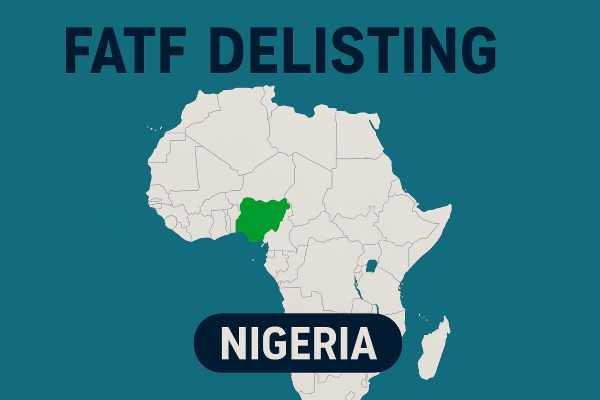
In a landmark development for Nigeria’s financial system and international credibility, the Financial Action Task Force (FATF) has officially removed the country from its grey list—a watchlist of nations under increased monitoring for deficiencies in anti-money laundering (AML), counter-terrorist financing (CFT), and counter-proliferation financing frameworks.
This historic achievement signals a restoration of trust in Nigeria’s financial governance and marks the beginning of a new era of transparency, investor confidence, and global reintegration.
At the core of this success is the Nigerian Financial Intelligence Unit (NFIU), which spearheaded a sweeping 19-point reform agenda under the leadership of Hafsat Bakari, in close coordination with the Ministry of Finance, Central Bank of Nigeria (CBN), Attorney-General’s Office, and other regulatory agencies.
FATF Delisting: What It Means for Nigeria’s Financial Ecosystem
The FATF’s decision, reached at its October 2025 Plenary in Paris, reflects a two-year transformation of Nigeria’s Anti-Money Laundering and Countering the Financing of Terrorism (AML/CFT) regime.
Key implications include:
- Global Credit Reinstatement: Nigeria is no longer categorized as a “high-risk jurisdiction,” restoring investor trust and easing compliance restrictions for Nigerian banks, fintechs, and capital market operators.
- Lower Risk Premiums: Cross-border transactions, foreign loans, and trade finance will attract lower costs as Nigeria’s financial risk profile improves.
- Improved Access to Global Finance: Development finance institutions like the IMF and World Bank, which use FATF compliance as a key benchmark, can now engage more freely with Nigerian financial institutions.
- Enhanced Foreign Investment Confidence: The delisting directly strengthens Nigeria’s appeal to global institutional investors, private equity funds, and infrastructure financiers.
According to President Bola Tinubu, Nigeria’s removal from the grey list is “not just a technical victory but a strategic validation of our economic reforms and financial integrity.”
Reform Milestones That Secured the Exit
Nigeria’s exit from the FATF grey list was built on a multi-layered reform agenda anchored on transparency, compliance, and enforcement.
Major legislative and institutional milestones include:
- Money Laundering (Prevention and Prohibition) Act, 2022.
- Terrorism (Prevention and Prohibition) Act, 2022.
- Operationalisation of a Beneficial Ownership Register to trace ultimate asset holders.
- Enhanced supervision of Designated Non-Financial Businesses and Professions (DNFBPs) such as law firms, real estate, and casinos.
- Inter-agency coordination between the CBN, NFIU, EFCC, SEC, and NDIC to tighten compliance.
- Adoption of advanced monitoring systems such as the Electronic Foreign Exchange Matching System (EFEMS) and FX Code for better transaction traceability.
The reforms collectively transformed Nigeria’s AML/CFT framework into one of Africa’s most robust, paving the way for FATF’s endorsement.
Institutional Reactions: Consensus on a Financial Turning Point
1. Central Bank of Nigeria (CBN): Building Systemic Integrity
The CBN hailed the decision as “an affirmation of Nigeria’s enhanced supervisory and regulatory frameworks.”
It noted that the FATF’s recognition followed “a successful on-site evaluation of Nigeria’s progress in risk-based supervision, compliance reporting, and inter-agency coordination.”
The central bank highlighted tangible benefits ahead — including cheaper international finance, faster remittance flows, and improved foreign exchange access for businesses and households.
2. Securities and Exchange Commission (SEC): Boost for Capital Market Confidence
SEC Director-General Dr. Emomotimi Agama described the delisting as a “welcome call to new investments,” asserting that it will reignite investor confidence, attract foreign portfolio flows, and bolster market depth.
He emphasized that compliance and transparency now stand at the core of Nigeria’s capital market reform agenda.
3. Infrastructure Concession Regulatory Commission (ICRC): A Game-Changer for Infrastructure Finance
According to ICRC DG Dr. Jobson Ewalefoh, the FATF delisting “repositions Nigeria as one of Africa’s most credible investment destinations.”
He said Nigeria’s **infrastructure financing gap—estimated at $2.3 trillion by 2043—**could now attract long-term private capital and PPP participation, thanks to lower risk premiums and renewed investor trust.
Expert Insight: Economic Ripple Effects and Long-Term Implications
Financial expert Prof. Uche Uwaleke, a leading capital market analyst, described Nigeria’s FATF delisting as “a signal of restored global trust and institutional credibility.”
He explained that being on the grey list previously caused “ripple effects across correspondent banking, cross-border financing, and foreign investment flows.”
With Nigeria now cleared, Uwaleke projected the following macroeconomic benefits:
- Increased foreign direct investment (FDI) inflows.
- Improved access to Eurobond markets with reduced yields.
- Strengthened naira liquidity through faster trade settlements and remittances.
- Lower borrowing costs for both government and private issuers.
- Enhanced credit ratings outlook from agencies like Moody’s and Fitch.
However, he cautioned that continued vigilance is key:
“Delisting is not the end of reform—it is the beginning of enforcement. Nigeria must institutionalize compliance and ensure no relapse in AML/CFT governance.”
BRANDECONOMY ANALYSIS: Why This Exit Matters for Nigeria’s Economic Future
Nigeria’s exit from the FATF grey list is not just an administrative victory—it is a geoeconomic inflection point.
It restores the country’s credibility in global capital markets, strengthens its AML compliance reputation, and sends a powerful signal to investors that the Nigerian economy is undergoing serious structural reform.
From a forensic finance perspective, the FATF delisting:
- Restores Nigeria’s credibility with correspondent banks, reducing transaction friction.
- Improves creditworthiness across Nigeria’s sovereign and corporate issuers.
- Makes the country’s financial system more transparent, accountable, and globally interoperable.
- Opens the door for infrastructure financing, foreign exchange inflows, and enhanced trade competitiveness.
For the Tinubu administration, this milestone validates its Renewed Hope economic agenda and underscores Nigeria’s transition from policy reform to policy credibility.
The Road Ahead: Sustaining Compliance and Deepening Reforms
Nigeria’s challenge now is sustainability.
Experts emphasize that the same rigour that took Nigeria off the grey list must be maintained across all sectors, particularly in fintech regulation, beneficial ownership transparency, and politically exposed persons (PEP) monitoring.
As the Chartered Institute of Directors (CIoD) noted, “Good governance, transparency, and institutional discipline must remain the pillars that keep Nigeria permanently out of high-risk classifications.”
BRANDECONOMY VERDICT: Nigeria’s FATF Delisting — A Strategic Win Beyond Compliance
Exiting the FATF grey list is a strategic milestone that restores investor trust, lowers financial transaction costs, and reinforces Nigeria’s image as a serious player in global financial governance.
But beyond the headlines, the true test lies ahead—sustaining institutional integrity, strengthening enforcement, and building a transparent financial ecosystem that drives inclusive growth.











